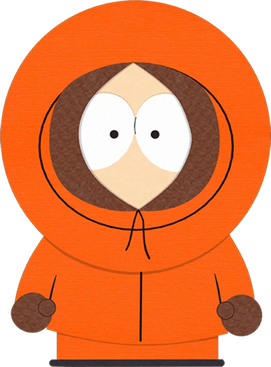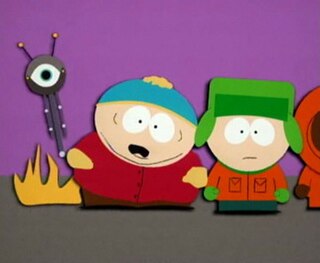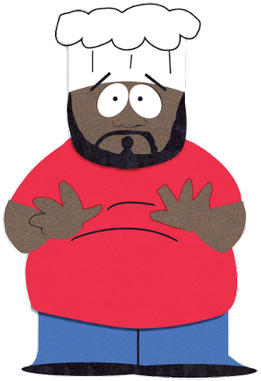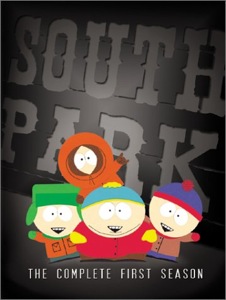
Eric Theodore Cartman, commonly referred to as just Cartman, is a fictional character in the adult animated sitcom South Park, created by Trey Parker and Matt Stone. He is voiced by Parker, and is one of the series' four main characters, alongside Stan Marsh, Kyle Broflovski, and Kenny McCormick. He first appeared with the name Kenny in the short film The Spirit of Christmas (1992), and later appeared in the 1995 film of the same title before debuting in "Cartman Gets an Anal Probe", the first episode of the series, on August 13, 1997.

Kenneth "Kenny" McCormick is a fictional character and one of the four main protagonists in the adult animated sitcom South Park, alongside Stan Marsh, Kyle Broflovski, and Eric Cartman. His often muffled and incomprehensible speech—the result of his parka hood covering his mouth—is provided by co-creator Matt Stone. After early appearances in The Spirit of Christmas shorts in 1992 and 1995, Kenny appeared in South Park television episodes beginning August 13, 1997, as well as the 1999 feature film South Park: Bigger, Longer & Uncut, where his uncovered face and voice were first revealed.

Stanley "Stan" Marsh is a fictional character in the adult animated television series South Park. He is voiced by and loosely based on series co-creator Trey Parker. Stan is one of the series' four central characters, along with Kyle Broflovski, Eric Cartman, and Kenny McCormick. He debuted on television when South Park first aired on August 13, 1997, after having first appeared in The Spirit of Christmas shorts created by Parker and long-time collaborator Matt Stone in 1992 and 1995.

Leopold "Butters" Stotch is a fictional character in the adult animated television series South Park. He is loosely based on co-producer Eric Stough and his voice is provided by co-creator Matt Stone. He is a student at South Park Elementary School.

"Good Times with Weapons" is the first episode of the eighth season of the American animated series South Park and the 112th episode of the series. It originally aired on March 17, 2004. In the episode, the boys are transformed into Japanese warriors after they buy martial arts weapons at a local market. Their sworn enemy, Professor Chaos, confronts them and a highly stylized battle ensues. The episode's animation routinely switches from the usual cutout-and-solid-color style to a highly stylized anime theme.

"Cartman Gets an Anal Probe" is the series premiere of the American animated television series South Park. It originally aired on Comedy Central in the United States on August 13, 1997. The episode introduces child protagonists Eric Cartman, Kyle Broflovski, Stanley "Stan" Marsh and Kenneth "Kenny" McCormick, who attempt to rescue Kyle's adopted brother Ike from being abducted by aliens.
"Scott Tenorman Must Die" is the third episode of the fifth season of the American animated television series South Park, and the 69th episode of the series overall. It first aired on Comedy Central in the United States on July 11, 2001. In the episode, high schooler Scott Tenorman makes Eric Cartman believe that buying pubic hair from him will make Cartman reach puberty. Realizing that he had been tricked, an angry Cartman plots revenge on Scott.

Chef Jerome Nigel McElroy, often referred to as just "Chef", is a fictional character on the Comedy Central series South Park who was voiced by Isaac Hayes. A cafeteria worker at the local elementary school in the town of South Park, Colorado, Chef is generally portrayed as more intelligent than the other adult residents of the town, and understanding to the children. His advice is often sought by the show's core group of child protagonists —Stan Marsh, Kyle Broflovski, Eric Cartman, and Kenny McCormick — as he is the only adult they completely trust. He frequently gives completely honest advice without considering whether it is appropriate for children, usually in the non sequitur form of a lascivious soul song.
"Ike's Wee Wee" is the third episode of the second season of the American animated television series South Park. The 16th episode of the series overall, it first aired on Comedy Central in the United States on May 20, 1998. In the episode, school counselor Mr. Mackey is fired, and turns to drugs. Meanwhile, the boys misconstrue what circumcision entails, and try to save Kyle's younger brother Ike from his upcoming bris.

"Mr. Hankey, the Christmas Poo" is the ninth episode of the first season of the American animated television series South Park. It originally aired on Comedy Central in the United States on December 17, 1997. The episode follows Kyle as he feels excluded from the town's Christmas celebrations due to being Jewish, finding solace in Mr. Hankey, a sentient piece of feces. Mr. Hankey does not come alive in the presence of other characters, who consequently think that Kyle is delusional. Meanwhile, the townspeople remove all religious aspects of Christmas to remain politically correct and inoffensive.
"Cartman's Mom Is a Dirty Slut" is the thirteenth and final episode of the first season of the American animated television series South Park. It originally aired on Comedy Central in the United States on February 25, 1998. The episode is the highest viewed episode in the entire South Park series, with 6.4 million views. It is part one of a two-episode story arc, which concluded with "Cartman's Mom Is Still a Dirty Slut". The episode follows Eric Cartman, one of the show's main characters, becoming curious about the identity of his father. He discovers that his father is most likely a man his mother had sexual intercourse with during an annual party called "The Drunken Barn Dance". Meanwhile, his friends Stan, Kyle and Kenny participate on America's Stupidest Home Videos, after filming Cartman playing in his yard with plush toys.
Liane Cartman, formerly known as Carol Cartman, is a fictional character in the adult animated television series South Park. She is the single mother of main character Eric, who raises him in the fictional town of South Park, Colorado. Liane is considered one of the more prominent parents of all the South Park parents, as she makes many appearances throughout the series.
"Cartoon Wars Part I" is the third episode in the tenth season of the American animated television series South Park. The 142nd episode of the series overall, it first aired on Comedy Central in the United States on April 5, 2006. It is the first part of a two-episode story-arc, which concludes with "Cartoon Wars Part II". In the episode, it is announced that a Family Guy episode will air with the Islamic prophet Muhammad as a character, leaving the whole of the United States fearing for their lives. Cartman apparently believes that the episode is offensive to Muslims and decides to go to Hollywood to try to get the episode pulled.

The first season of the animated television series South Park aired on Comedy Central from August 13, 1997 to February 25, 1998. The creators Trey Parker and Matt Stone wrote most of the season's episodes; Dan Sterling, Philip Stark and David Goodman were credited with writing five episodes. The narrative revolves around four children—Stan Marsh, Kyle Broflovski, Eric Cartman and Kenny McCormick—and their unusual experiences in the titular mountain town.

The second season of South Park, an American animated television series created by Trey Parker and Matt Stone, began airing on April 1, 1998. The second season concluded after 18 episodes on January 20, 1999; it remains the longest season of South Park to date. Almost all the episodes were directed by series co-creator Trey Parker, with the exception of two episodes directed by Eric Stough.

The sixth season of South Park, an American animated television series created by Trey Parker and Matt Stone, began airing on March 6, 2002. The sixth season concluded after 17 episodes on December 11, 2002.

Gerald "Jerry" Broflovski and Sheila Broflovski are fictional characters in the animated television series South Park. The two are an upper middle-class married Ashkenazi Jewish couple who raise their ten-year-old son Kyle and three-year-old Canadian-born adopted son Ike in the fictional town of South Park, Colorado.
The Spirit of Christmas is the title given to two adult stop motion animated short films created by the duo Trey Parker and Matt Stone. The two films were released at different periods—the first in 1992, and the second in 1995—and form the basis for the animated series South Park, the latter short featuring more established depictions of the series' setting and characters. To differentiate between them, the respective films have been retroactively referred to as Jesus vs. Frosty and Jesus vs. Santa. A clip of both films appears on two respective billboards during the opening sequence for South Park's first four seasons.














